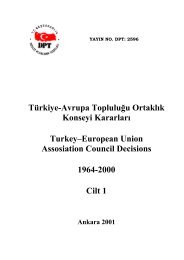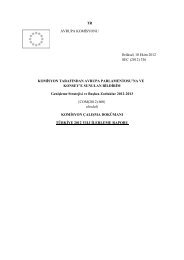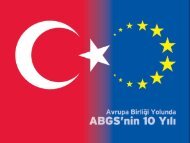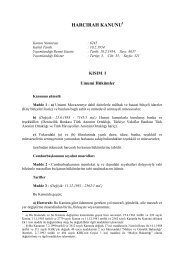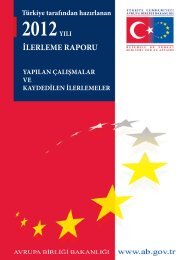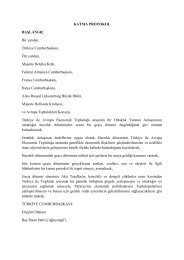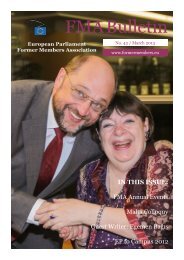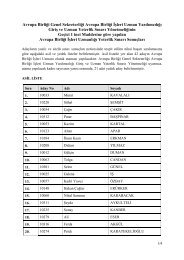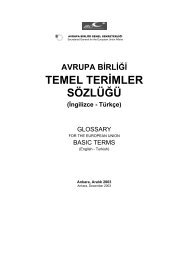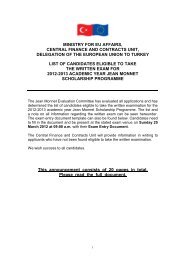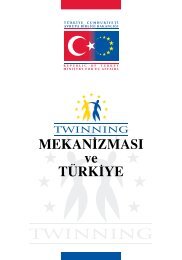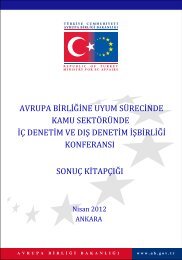2010 ilerleme raporu - Avrupa BirliÄi BakanlıÄı
2010 ilerleme raporu - Avrupa BirliÄi BakanlıÄı
2010 ilerleme raporu - Avrupa BirliÄi BakanlıÄı
You also want an ePaper? Increase the reach of your titles
YUMPU automatically turns print PDFs into web optimized ePapers that Google loves.
In June 2007, the Court of Cassation ruled that persons who participate and are elected in<br />
religious elections held in the patriarchate should be Turkish citizens and be employed in<br />
Turkey at the time of the elections. However, Turkish and foreign nationals should be treated<br />
equally as regards their ability to exercise their right to freedom of religion by participating in<br />
the life of organised religious communities in accordance with the ECHR and the case law of<br />
the ECtHR.<br />
Personal documents, such as identity cards, include information on religion, leaving potential<br />
for discriminatory practices. In January, in the Sinan Isik v. Turkey case the ECtHR decided<br />
that indication of religion on identity cards was in breach of the Convention.<br />
Regarding places of worship, non-Muslim religious communities report frequent<br />
discrimination and administrative uncertainty. Applications to authorities for allocation of<br />
places of worship continued to be refused. Two cases regarding Alevi places of worship (Cem<br />
houses) have been concluded before the courts, and applications have been refused. In May<br />
<strong>2010</strong>, a Cem house applied to the ECtHR after exhausting all other domestic remedies.<br />
Despite the de facto recognition by some municipal councils of Cem houses as places of<br />
worship, the overall policy of not recognising them has not changed.<br />
Protestant and other Churches (e.g. the Kurtuluş and Batıkent Churches in Ankara) have not<br />
been able to obtain permission for places of worship within the boundaries of their provinces.<br />
Jehovah’s witnesses had similar problems, as the courts found that their place of worship in<br />
Mersin violated the zoning law. This case has been taken to the ECtHR. The same religious<br />
community has a similar case before the courts related to a worship place in Izmir.<br />
Jehovah’s witnesses face tax claims by the municipalities of Istanbul and Ankara. The<br />
municipal authorities sent demands for payment of property tax for their places of worship,<br />
despite their exemption in principle following a Court of Cassation decision recognising their<br />
religion under Christianity. Several court cases are pending on taxation issues.<br />
Missionaries are widely perceived as a threat to the integrity of the country and to the Muslim<br />
religion. A court case against two missionaries in Silivri is continuing.<br />
The court case concerning the killing of three protestants in Malatya in April 2007 continues.<br />
A police report, prepared at the request of the Chief Public Prosecutor’s Office in Istanbul,<br />
drew attention to the link between the killing of protestants in Malatya and the Ergenekon<br />
case.<br />
Judicial proceedings against conscientious objectors on religious grounds continued. Public<br />
statements on the right to conscientious objection have led to convictions. Implementation of<br />
ECtHR judgments regarding conscientious objectors is still pending. Turkey has adopted no<br />
legal measures to prevent repetitive prosecution and conviction of conscientious objectors.<br />
Several members of the Jehovah’s Witness's community face court cases as conscientious<br />
objectors. A military court rejected the right to conscientious objection.<br />
Overall, freedom of worship continues to be generally respected. The implementation of the<br />
Law on foundations continued, albeit with some delays and procedural problems (see the<br />
chapter on Property rights). The dialogue with the Alevis and with the non-Muslim religious<br />
communities continued but has not yet produced results. Announcements on the Halki<br />
(Heybeliada) seminar were not followed up. Members of minority religions continue to be<br />
subject to threats by extremists. A legal framework in line with the ECHR has yet to be<br />
EN 24 EN




